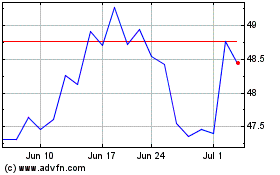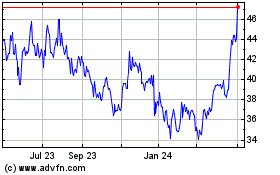By Shan Li and Anthony Shevlin
This article is being republished as part of our daily
reproduction of WSJ.com articles that also appeared in the U.S.
print edition of The Wall Street Journal (August 7, 2019).
BEIJING -- Tencent Holdings Ltd. is negotiating to buy 10% of
Universal Music Group, the world's largest music company, from
Vivendi SA for about EUR3 billion ($3.36 billion) -- a deal that
would strengthen the Chinese internet giant's growing clout in the
global record industry.
The investment, if consummated, also gives Tencent an option to
double its stake. A deal would give it a seat at one of the world's
music giants. Los Angeles-based Universal has signed blockbuster
artists like Ariana Grande, Drake and Billie Eilish. Its stable
also includes classic acts like Queen and the Beatles.
It would also tighten Tencent's dominance of the music industry
in China, where consumers have quickly adopted streaming platforms
and shown increasing willingness to pay for music.
Tencent Music Entertainment Group, the tech giant's
music-streaming business, went public in December in one of the
biggest U.S.-listed debuts in recent years. Tencent Music operates
several popular apps, including QQ Music and an online karaoke
platform.
Tencent wants to be seen as "the leading music platform in
China," said Shawn Yang, managing director of research firm Blue
Lotus Capital Advisors.
Vivendi last year said it was considering selling up to 50% of
Universal, but ruled out an initial public offering, seeking to
cash in on a resurgent music industry. The talks with Tencent
represent a less ambitious step -- at least initially. The
potential deal values all of Universal at EUR30 billion.
Under the terms of the deal, announced Tuesday by the French
media company, the Chinese internet giant would have a one-year
option to acquire an additional 10% stake in Universal at the same
terms.
"Vivendi is eager to explore enhanced cooperation which could
help UMG capture growth opportunities offered by the digitization
and the opening of new markets," the company said. It added that it
hoped the deal would improve the promotion of Universal's
artists.
Vivendi's investors welcomed the move, with shares up 7% in
trading in Paris, despite analysts at Citi saying the valuation was
below their expectations.
"While there is no doubt the implied equity value is above what
is currently implied by the market price -- around EUR25 billion --
it is also below the top end of the range," Citi said. It added
that bulls were expecting a valuation between EUR30 billion and
EUR40 billion.
As for Tencent, Citi said having a stake in one of the three big
music labels will offer it strategic insights on how the industry
could develop.
Aside from boosting Tencent's position in China's online music
world, a stake in Universal helps the Chinese company block rival
Bytedance Inc. from music licensing deals, some analysts said.
Bytedance's wildly popular short video apps TikTok and Douyin
have challenged Tencent's dominant social networking app WeChat for
advertising revenue and user time. TikTok and Douyin allow users to
add snippets of music to their videos -- a process that depends on
licenses from Universal and other major music companies.
"If there is anything that can create pressure on TikTok, it's
music," said Blue Lotus's Mr. Yang. "It still relies heavily on
music copyright."
Tencent has amassed stakes in hundreds of companies in recent
years, from fresh startups to publicly listed technology firms. The
company has taken high-profile stakes in overseas companies
including Spotify Technology SA, Tesla and Epic Games, creator of
the hit videogame "Fortnite." In 2016, Tencent and its partners
paid $8.6 billion for a majority stake in Supercell Oy, the Finnish
game maker behind "Clash of Clans."
But the company has reined in its overseas deal-making this year
as economic growth has slowed at home and potential investments
face greater regulatory scrutiny in the U.S. amid escalating trade
tensions, analysts said.
The transaction is subject to due diligence and Vivendi said it
plans to continue seeking other potential buyers for an additional
minority stake in Universal.
Tencent's interest in Universal shows how the music industry is
turning the page on an era of technological disruption that once
bedeviled it.
Universal now benefits from subscription-based streaming
services like Spotify and Apple Inc.'s Apple Music, which have
emerged as revenue growth drivers. Their growth is outpacing
declines in physical music sales and digital downloads.
Universal and its rivals -- Warner Music Group Corp. and Sony
Corp.'s Sony Music Entertainment -- rake in royalty payments
whenever listeners access their songs through the streaming
services. Last year, Spotify sold shares to the public via direct
listing in April that illustrated a rekindling of investor interest
in the music business
Against this backdrop, Universal has become a bright spot for
Vivendi. The company last month said its first-half net profit more
than tripled, boosted by the growth of its music business.
Write to Shan Li at shan.li@wsj.com
(END) Dow Jones Newswires
August 07, 2019 02:47 ET (06:47 GMT)
Copyright (c) 2019 Dow Jones & Company, Inc.
Tencent (PK) (USOTC:TCEHY)
Historical Stock Chart
From Mar 2024 to Apr 2024

Tencent (PK) (USOTC:TCEHY)
Historical Stock Chart
From Apr 2023 to Apr 2024
